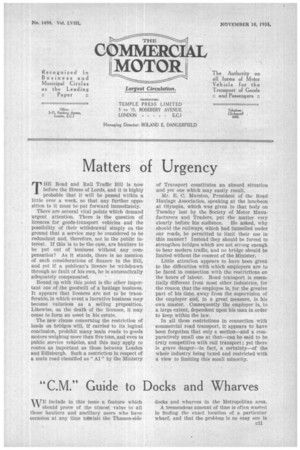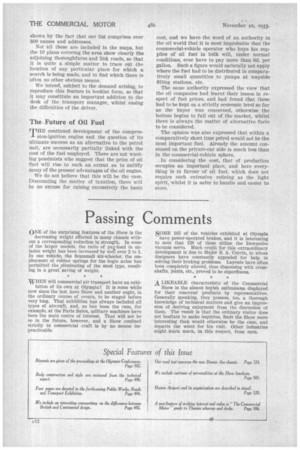Guide to Docks and Wharves N ATE include in this issue
Page 41

Page 42

If you've noticed an error in this article please click here to report it so we can fix it.
a feature which v should prove of the utmost value to all those hauliers and ancillary users who have occasion at any time tdbvisit the Thames-side docks and wharves in the Metropolitan area.
A tremendous amount of time is often wasted in finding the exact location of a particular wharf, and that the problem is no easy one is shown by the fact that our list comprises over 800 names and addresses.
Not all these are included in the maps, but the 10 plans covering the area show clearly the adjoining thoroughfares and link roads, so that it is quite a simple matter to trace out the location of any particular place for which a search is being made, and to find which there is often no other obvious means.
We intend, subject to the demand arising, to reproduce this feature in booklet form, so that it may constitute an important addition to the desk of the transport manager, whilst easing the difficulties of the driver.
The Future of Oil Fuel
rriFIE continued development of the compression-ignition engine and the question of its ultimate success as an alternative to the petrol unit, are necessarily partially linked with the cost of the fuel employed. There are not wanting pessimists who suggest that the price of oil fuel will rise to such an extent as to nullify many of the present advantages of the oil engine. We do not believe that this will be the case. Discounting the matter of taxation, there will be no excuse for raising excessively the basic cost. and we have the word of an authority in the oil world that it is most improbable that the commercial-vehicle operator who buys his supplies of oil fuel in bulk will, under normal conditions, ever have to pay more than 6d. per gallon. Such a figure would naturally not apply where the fuel had to be distributed in comparatively small quantities to pumps at wayside filling stations, etc.
The same authority expressed the view that the oil companies had learnt their lesson in respect of fuel prices, and had found that these had to be kept on a strictly economic level so far as the buyer was concerned, otherwise the bottom begins to fall out of the market, whilst there is always the matter of alternative fuels to be considered.
The opinion was also expressed that within a comparatively short time petrol would not be the most important fuel. Already the amount consumed on the private-car side is much less than In the commercial-vehicle sphere.
In considering the cost, that of production occupies an important place, and here everything is in favour of oil fuel, which does not require such extensive refining as the light spirit, whilst it is safer to handle and easier to store.




























































































































